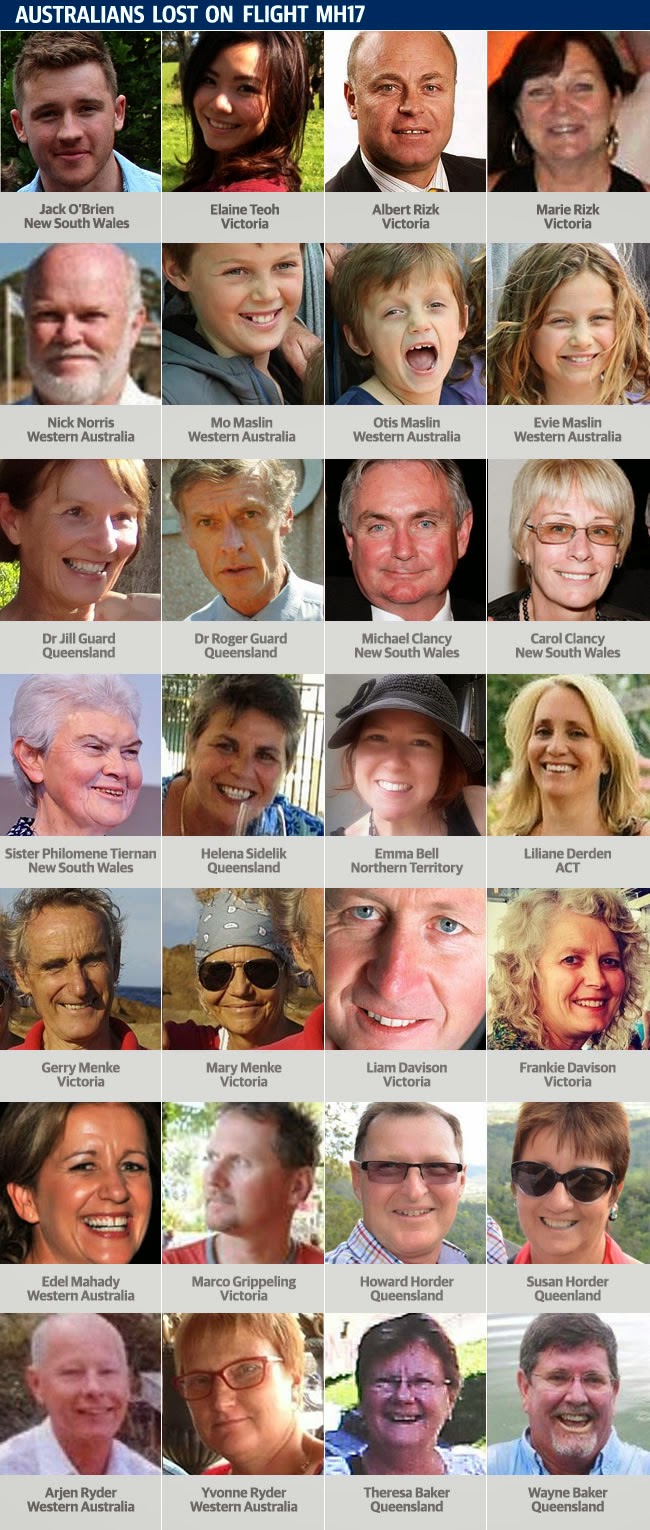Simon Benson
The Daily Telegraph
July 25,2014
LIKE most of us Tony Abbott was in bed asleep when Flight MH17 was shot out of the sky. He was staying at his modest digs in the Canberra police college. By the time news of the horrific incident was beginning to filter through the silos of the Department of Foreign Affairs and Trade and the Prime Minister’s own department, the PM was down in the college gym for his morning workout.
He arrived at his Parliament House office early, to prepare for a carbon tax event — which, like almost every other commitment that day, was promptly cancelled.
At 6am he jumped on a phone hook-up with his senior advisers and media staff.
Some of those on that call note that Abbott reacted with a sense of calm and purpose that took any hint of panic out of the air.
“At the end of it, everyone knew what they had to do and we were allowed to go and do it,” one said.
Abbott has shown a brand of leadership that for some reason many commentators claim is surprising.
There is no doubt that he has led the world. Those that know him will tell you that he is no “surrender monkey”.
The fact that he put a spine into US President Barack Obama and got Russian President Vladimir Putin on the phone — twice — may seem remarkable for a minnow such as Australia.
It is a feature of Abbott’s personal ethics — he doesn’t say one thing privately and another thing publicly — that has earned him the respect of world leaders.
However, Abbott’s demonstration of strong and decisive leadership should not be cast as extraordinary or anything other than what Australians have a right to expect from their Prime Minister.
“People seem to be overly grateful for something that every elector has a right to expect,” said one insider remarking on the public response. “People seem to have forgotten that they have a right to it.”
What Abbott has exposed this week more than anything is the complete vacuum of leadership Australia had been living under in the six years of Labor government.
While it has played out publicly, in the reassuring, compassionate and decisive manner in which he has conducted himself, as with an iceberg Abbott’s depth of leadership lies mostly beneath the surface.
A source inside the National Security Committee claims Abbott has transformed the dynamics of its meetings, which have been held on a rolling basis since the attack.
This is a committee of not just key cabinet ministers but attended by the key agency chiefs including Chief of the Defence Forces, head of ASIS Nick Warner, ASIO boss David Irvine and Richard Maude — a former Rudd staffer who is head of the Office of National Assessments.
Abbott not only chairs the meeting, he leads it. He listens to all views and is respectful to the bureaucrats but he makes decisions and then lets people do their job.
The source on that committee claimed there had been a dramatic change since Rudd and Gillard, with the latter accused of often not even turning up when she was deputy PM.
“Everyone in that room has drawn a lot of strength from the PM in the past week,” said the insider. “And these are some pretty seriously smart people.”
But Abbott’s office has also come into its own over the past week. Few would remember that his Chief of Staff Peta Credlin was a former international defence policy adviser to Defence Minister Robert Hill.
Andrew Shearer, Abbott’s national security adviser, also worked under John Howard and has been the bridge to Washington throughout the current crisis.
The depth of experience in the national security team in the PM’s office — and in key portfolios — should now be evident to everybody. It is certainly privately acknowledged, however reluctantly, by some senior Labor MPs.
Just as importantly, Credlin has been key to ensuring staff and ministers not directly involved in the crisis stayed focused on their own work so the machinery of government more generally doesn’t grind to a halt.
Credlin, recalling what happened during 9/11, sent an email to all advisers on Sunday reminding them of this.
“… if you are not involved in MH17 do not be distracted by it,” she wrote.
“I know that’s hard — I was in a similar position as an adviser in 2001 after September 11 — but it is critical that the ongoing work of government is progressed.”
It would be wrong to say that the handling of this tragedy has gone like clockwork.
This crisis has certainly shown where the system works. But more importantly it has exposed where the system isn’t working and where it had been run down under the former government.
There is likely to be some significant changes coming as a result.
There is also a political lesson from all of this for Labor, which continues to underestimate Abbott.
It was in the foreign affairs and national security space that Labor believed Abbott would experience his greatest failures, suggesting he would be an embarrassment on the world stage.
Yet it is in this space that Abbott has in fact had his greatest success.


































